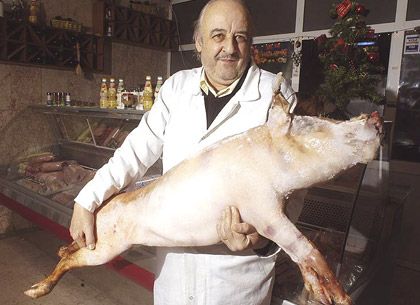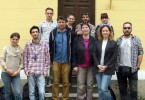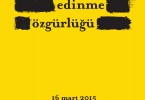Good quality pork chops, bacon, sausages and other pork products are probably the most sought after delicatessen by the expats living in Istanbul.
These are the products that are hard to come by in a Moslem country where consumption of pork is proscribed by religious rules.
But still, there is a small and spotlessly clean shop not far from Istanbul Bilgi University’s Dolapdere campus where the customers are offered a wide variety of charcuterie products.
Lazaros Kozmaoglu, 63, is the last pork butcher of Istanbul. He comes from a very old Greek family that has its roots in the central Anatolian town of Karaman. He says his family moved to Istanbul 200 years ago.
“Actually I started this profession by accident. In 1967 I was a partner of a salami factory. The boss left the country after his business failed. I took it over,” explains Kozmaoglu.
He opened the shop in Dolapdere in 1977 and for more than 30 years he has probably been the only pork product supplier in the city.
“We are the only institution that has a license to sell pork,” he observes smilingly. “Some others sell pork without a proper license.”
Kozmaoglu buys his pork from the pig farms in Mersin and Antalya and processes it himself.
“When I started the business there were some 70 pig farms in Istanbul only and at least five or six shops selling pork. Now the amount has decreased. In the old days I had almost 45 different products in the shop. Now I only offer six, seven varieties,” he explains.
Kozmaoglu also complains about the quality of mass produced processed meat like salami sold at supermarkets and other shops. “If you compare the price of meat with the prices put on these products you will get an idea of what kind of quality they are offering,” he says.
Controls on products of processed meat are not strict enough, Kozmaoglu points out. “I wish they would come everyday to control the shop. I take my customers inside and show them how we work. I don’t sell anything that I wouldn’t eat myself,” he says.
Just behind Kozmaoglu’s shop there is the Greek Orthodox Church of Panayia Evangelistria. The neighborhood was predominantly Greek when Istanbul’s Greek or Rum minority numbered 100,000 or more in the early 19’/50s. Today, Istanbul’s Rums, as they are called, have dwindled down to 2,000.
There are only 10 or 15 Rums living in the neighborhood nowadays. And for some of them Kozmaoglu’s shop is a meeting place. They come and chat and drink tea, even if they don’t buy anything.
Istanbul Rums who have emigrated to Greece also come to shop at Kozmaoglu’s shop when they visit Istanbul.
Referring to the riots against the Rums and non-Moslem minorities in Istanbul in 1955, Kozmaoglu says, “Nothing is the same after the events of 6-7 September.”
But he expresses his intention to stay. “Those who respect the tombs of their fathers and grandfathers stayed here. They did not leave.”
Kozmaoglu’s shop does not have a big sign outside. It is located on a narrow street just next to the petrol station before you arrive at Bilgi’s Dolapdere campus coming from Osmanbey. Those who really hanker for good mortadella or bacon cannot miss it.








Bizde varız artık 🙂